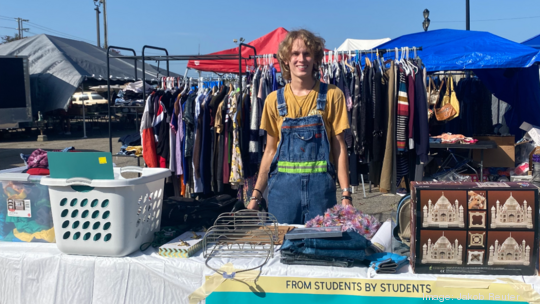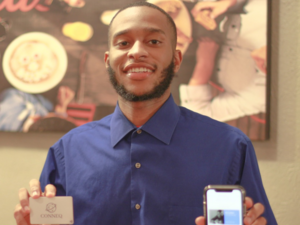
The first item Jakob Reuter sold was a perfectly good fan he found in the trash.
He turned that idea – taking unwanted items in good condition and selling them – into an online consignment store, U Thrift.
“Going to Goodwill, it’s a fun search, and when you actually find the gem, you get pretty stoked about it. Nonetheless, it is a search, there’s not a lot of fashionable items in Goodwill all the time,” Reuter said.
Reuter, a junior at Elon University, co-owns U Thrift with Elon senior Grace Granger. They target their online sell-and-buy business towards the demographic they know best, other Elon students.
Here’s how it works:
They receive unwanted clothes and items from students using the “sell” page on their website. Together, Reuter and Granger do as much possible to sell the clothes on their website, from cleaning and repairs to refurbishing.
If an item sells, U Thrift gives 30 to 40% of the profit to the original seller. If an item does not sell within 90 days, U Thrift will either return the item to the seller, attempt one last highly discounted sale at The Raleigh Market or Plato’s Closet, or donate it to the Salvation Army or Goodwill.
U Thrift sells most of its items – at the end of their most recent 90-day term limit, they had about 20 items left out of 240.
Since launching at the end of February, U Thrift has made roughly $1,200 in revenue.
U Thrift also recently launched a brand ambassador program, partnering with Elon students who have a substantial social media following to post about buying and selling with U Thrift.
U Thrift offers free-pick up and free delivery for Elon students, as the university mail service offers free student-to-student mailing. They also reuse cardboard boxes to cut costs and environmental impacts.
Eventually, Reuter hopes to expand U Thrift to other college campuses.
Outside of U Thrift, Reuter is an intern at Launch Greensboro. In this internship, he assists entrepreneurs who are in Launch Greensboro’s programs with their projects. He utilizes his own skills, such as web development, web design and photography, to help in whatever way he can.
“A lot of the projects I’m doing for these entrepreneurs were very similar to the projects that I’m doing every day trying to get more traffic to the website, creating engaging posts,” Reuter said.
Reuter was also named a University Innovation Fellow at Elon, a program run by Stanford University’s Hasso Plattnew Institute of Design. In this program, students complete six weeks of training in the design-thinking process, identify a pain point on their own campus and pitch a solution.
As a University Innovation Fellow, Reuter found that there was an abundance of clubs on Elon's campus and is working to increase interconnectivity between the clubs.
Here’s more from Reuter in a Q&A. The interview has been edited for brevity and clarity.
How did you coome up with U Thrift?
This was created in an entrepreneurship class. We were required to find a pain point and then a solution. U Thrift just so happened to be our solution that we continued after the class.
For me, I personally am very invested in sustainability. Thrifting has always been something I love doing. It came down to noticing how the students, especially by the end of the year, just throw their stuff out into the dumpsters, rather than donate it or try to sell it themselves. We figured that can be us that collects their items and gives them money back.
What makes U Thrift different from its competitors, like brick-and-mortar thrift stores and online consignment websites like Depop, Poshmark and thredUP?
For websites like Poshmark and Depop, it's the individuals that are selling their own items. A lot of people have a lot of stuff in their closets – we've gotten trash bags full of stuff. They just don't have time to sell it themselves.
I am into photography so I know what makes a good photo so I can make products look good. My partner is good at managing, and she cleans all the items. So, we both have our own duties, but we do all the work for the client.
There are people that go to stores to give their stuff away to see how much money they can get for their items. A lot of times they don't get as much as they thought they would, and the stores give them back what they think they won't sell. We’re just putting everything up and we're going to give it a chance, no matter what. We spend time to make sure it looks good and can be sold; we alter them, so that would mean tie dye or bleach dye, whatever we have to do to make it look better than it did to try to sell it with one last one last hurrah.
What happens after you and your co-owner both graduate Elon?
We've talked to younger students to try to get them in early if they wanted to potentially continue this and not have us be in it anymore, but depending on how the rest of the year goes, we may just continue to do it off-campus with student leaders on campus. That'd be ideal, because then that would mean there's potential to expand. If not, we're going to try to leave it here with students that we trust. Because we put a lot of work into it and there's a great system that we've built, it'd be a shame for us to, because we're leaving, have it stop.







